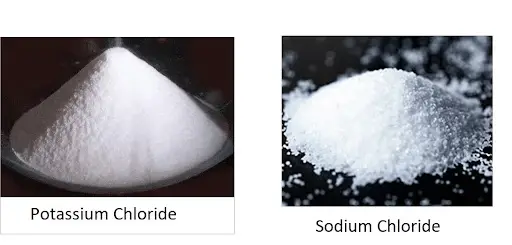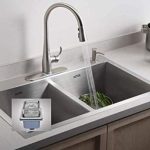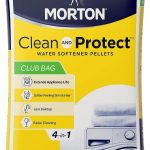Hard water is a huge concern, and everyone among us struggles with hard water issues. A water softener is a much-needed option for taking care of hard water. But, what salt should you use for the water softener? Want to know the differences between the Potassium Chloride vs Sodium Chloride comparison? Let us check out the differences between the two water softener salts and find which among them works best for your needs.
Point to note that the “Salt” written in the title of the article means the Sodium Chloride which we use as table salt in our house.
Sodium chloride is the right choice if you have no sodium-related health issues and want an inexpensive water softener experience. It can be a good pick for inexpensive and effective means as it can be added to any water softener. Potassium chloride also comes with its own plus points but can be a little expensive. In terms of usefulness, both of them are of practical use.

Sodium Chloride vs Potassium Chloride – What Are they?
The water softeners use two types of salts. One of the most commonly used water softener salt is Sodium Chloride, while an equally popular option for the best salt is Potassium Chloride. The two types of salts come with their own minor differences and can be used interchangeably in most of the scenarios.
| Potassium Chloride | Sodium chloride | |
|
Formula |
KCL |
NACL |
|
Common name |
Potassium salt |
Table salt |
|
Appearance |
White crystalline solid |
White crystalline solid |
|
Taste |
Salty |
Salty |
|
Water solubility |
Highly soluble |
Highly soluble |
|
Melting point |
770 degree C |
801 degree C |
|
Boiling point |
1420 degree C |
1465 degree C |
|
Density |
1.98 g/ cm3 |
2.17 g/cm3 |
|
Application |
Food seasoning, fertiliser, medicinal usage |
Water softening, cooking, de-icing |
Sodium Chloride
Sodium chloride is the regular table salt that we have been using for ages. The same salt that we use to add taste to our food has been observed to be equally effective in its water-softening requirements.
Sodium chloride is used for removing mineral ions and replacing them with sodium ions. This goes a long way in softening your hard water.
Benefits offered by sodium chloride:
Some of the benefits that you stand to get with sodium chloride can include:
- It is extremely affordable and readily available
- It takes little of a time to soften your hard water.
- Sodium chloride comes with its own health benefits
Potassium Chloride
Potassium Chloride is yet another great option to help you in achieving a better water softener performance. It works precisely similarly to Sodium chloride and instead of adding sodium ions to your water, it adds potassium ions.
Benefits of Potassium Chloride:
A few of the benefits that you stand to get with the potassium chloride would include:
- The Potassium is a great nutrient to help you in terms of the best nutrient for your body.
- More environment friendly than the sodium chloride
- It will add a minimal amount of potassium to your water
Why Is Potassium Water Softener So Expensive?
The extraction of potassium chloride is more expensive when compared to the extraction of sodium chloride. That is why Potassium chloride is more expensive. Potassium is a naturally occurring material in the environment and is used primarily for agricultural purposes.
The two water softener salts come with their own differences. Based on your individual lifestyle, you can select the right water softener to meet your individual needs and expectations. If you are a price-sensitive customer, we recommend opting for sodium chloride water softeners. It is effective and inexpensive when compared to potassium chloride.
Potassium vs salt water softener – An overview
What are the prime differences between the Sodium chloride and potassium chloride water softeners? They are almost similar but do have a few minor differences based on the way that they work. We will check out a few differences between the two types of water softeners.
Drinking softened water has its own benefits and understanding the different methods used for water softening can be helpful in achieving better results.
The amount of water softener you would need
Both potassium chloride and sodium chloride provide you with a similar degree of efficiency in handling the water softening process. But, the amount of salt required for the softening process can be a differentiator. You will need to use more potassium chloride for softening the same amount of water as opposed to the sodium chloride. That would also mean you will need to replenish your water softener much more frequently in the case of potassium chloride as opposed to the sodium chloride.
Cost
The cost of potassium chloride has been observed to be higher than the price of sodium chloride. The sodium chloride is readily available and less expensive. You would find the sodium salt softeners are three times less costly than the potassium chloride options. The high cost of the potassium chloride is one of the primary reasons that results in a high cost for the potassium chloride.
Health-related reasons
Potassium is one of the prime nutrients that your body invariably needs. That is one of the reasons why you would need to focus on potassium chloride as opposed to sodium chloride for the best health benefits. The salt can add only a small amount of sodium to your water. In case you are someone who needs lower sodium intake, using potassium chloride would be a practical solution.
Eco-friendliness
When it comes to the benefits of softener salt, it is always essential to go with potassium chloride. The potassium chloride, when disposed of – can be absorbed by the plants. The disposed off potassium can help the plants to grow better. The sodium on the other hand may not benefit the plants in any way when disposed off.
How do Potassium Chloride and Sodium Chloride Salt Work?
Both potassium chloride and sodium chloride work in a similar manner for softening the water. The principle that forms the basis of the water softeners and salts is called ion exchange. The slats remove the ions that cause hard water and replace them with the ions that soften them.
Water softeners work by removing the magnesium, calcium, and other harmful chemicals and minerals that may be in a higher concentration. A water softener generally includes a tank that consists of thousands of resin beads. When they have generated afresh, these beads are filled with the sodium and potassium ions – based on whether you are using potassium chloride or sodium chloride.
As the hard water passes through these beads, the calcium and magnesium ions are attracted while releasing the sodium and potassium ions. That converts the hard water into soft water.
Potassium Chloride Benefits in Drinking Water
Most people think that using Potassium Chloride may not be an ideal choice in the water softeners. Since the sodium chloride has a few health related concerns and there are people who may be sensitive to sodium chloride, it may be advisable to switch to the potassium chloride for better benefits.
Some of the benefits of potassium chloride in drinking water would include
Health benefits
Some of us may have issues with salt intake and switch to potassium chloride can be a great alternative. The excessive use of sodium chloride is likely to result in heart disease, stroke, stomach ulcer, and other serious concerns. It has been estimated that close to 90% of Americans use too much of sodium, and thus switching to potassium chloride can be a healthy alternative.
Environmental benefits
Disposal of the sodium water softener is a considerable concern, and it is always advisable to switch to potassium chloride to ensure a better environment-friendly disposal. Sodium or brine is bad for plants and can kill them. Potassium, on the other hand, is suitable for plants and has been used in the fertilizers for ages.
Takes care of several ailments
Potassium chloride has been observed to be a handy pick against the issues such as insulin deficiency, gastrointestinal infections, diarrhea, vomiting, as well as kidney problems. The increase in potassium intake can go a long way in promoting your kidney functioning. Potassium has also been known to help you with health issues such as muscle contractions and nerve function to heartbeat regulation and cell function.
How to Dissolve Potassium Chloride Bridge in a Water Softener?
A salt bridge is the hard crust that forms on the brine tank. That would leave a gap between the salt and the water. This can prevent the salt from dissolving properly into the water for making a brine solution.
These salt bridges can form as a result of the high humidity. It can also be a result of the changes in the temperature around the water softener. Using too much salt in the water softener can also cause the formation of salt bridges.
If you find the salt bridges in your potassium chloride water softener, you can apply a few of the solutions here below to fix the issues:
- You can use a long broom or a long metal piece to push the bridge down
- You may also move the handle around the center of the tank which can help break the bridge
- You can even pour hot water over the bridge to help you dissolve the bridge.
Can You Switch the Water Softener to Potassium?
Yes, you can definitely switch to potassium chloride from sodium salt. Scientifically speaking, potassium chloride is also a salt just like the common salt that goes by the scientific name of Sodium chloride. It can be a great replacement for sodium chloride by almost every count.
There would be a few tweaks that would be needed in most cases. Some of the changes that you may need to opt for include the size of the water softener tank to be used, the frequency of salt change or recharge of the softener, and a few other salt-specific changes that may be necessary.
Is it Safe to Drink Water Softened With Potassium Chloride?
It is definitely safe to drink water softened with potassium chloride. It has been observed that potassium chloride provides you with better health benefits as opposed to sodium chloride. If you are someone who has health conditions that need you to limit the consumption of sodium chloride, switching to a potassium chloride solution will be a better choice.
Potassium has been known to be one of the best when it comes to good health benefits. It is known to be a good pick to take care of a few health conditions, such as diarrhea, gastrointestinal conditions, and a few kidney related ailments. If you are someone who needs to be on a low-sodium diet, choosing the potassium chloride should be the right pick that you would find good enough.
Sodium Chloride vs Potassium Chloride Water Softener – What Should You Choose?
The choice between the potassium chloride and sodium chloride water softener would be dependent on your individual preferences. Both sodium chloride and potassium chloride have been known to provide an adequate capacity in softening your hard water.
If you are looking at the value-for-money option, sodium chloride should be the best pick. The price difference would be three times between sodium chloride and potassium chloride. Moreover, sodium chloride will not be regenerated to a huge degree. That would mean it would need less salt consumption as opposed to the potassium chloride.
Potassium chloride is available at a higher price point, and in addition, it is also less efficient in water softening. But, it does come with a few health benefits as well. The salt has been known to be healthy while sodium can be detrimental to your health if used in a high quantity. Potassium is also known to be eco-friendly, which should be another added advantage that you stand to gain with the potassium chloride.
The key point is – if you are health conscious, opt for potassium chloride. On the other hand, if you are looking at the cost, go with sodium chloride.
Check Out a Few Good Water Softener Salts
Now that we have learned the positive effects offered by potassium chloride and sodiu9m chloride for the best water softening requirements, we will check out a few promising options that may prove to be handy and effective.
Morton Clean & Protect
The brand Morton Clean & Protect has been known for providing outstanding quality with respect to the best water softener salt that you can lay your hands on. The high purity levels of 99.9% that the salt provides can make it an up-and-coming option. The value for money product is available in 40-pound bags.
Features
- It comes in the form of evaporated salt pellets which makes it the purest form of salt
- It helps stop the build-up of scales and improves the lifespan of the equipment.
- Easier to clean the fixtures and appliances
- The bag is easy to carry and pour
The pellets formed off the salt will ensure that it has a very low amount of impurities. The lack of any residues when using the salt should ideally make it stand out from the rest in terms of usability
- Highly affordable pricing
- Easy and best means to dissolve in water
- Highly effective softening capability
- Smaller bags available
Diamond Crystal Solar Naturals
Sold by the popular supplier Diamond Crystal, the water softener salt has been one of the best that you would find much decent and unique in its own right. The high level of purity and ease of dissolving are a couple of other parameters that would make it a great pick. In fact, it is made from the naturally occurring products, and that would further make it more natural.
Features
- Completely natural salt
- No additives of any nature added
- Available in multiple bag options
- Scale free softening guaranteed
- Improves appliance lifespan
The product is 99.6% pure, and that should make it stand apart from the rest of the competing prodcuts. It has been known to resist the formation of salt bridges. It is also safe for a host of other applications, such as curing pickles and other foods
- No chemicals added – free natural salt
- No accumulation of tank residue
- Multiple usage.
- The occasional occurrence of contaminants
A Few FAQs
Can you mix salt and potassium in a water softener system?
Yes, you can mix both sodium and potassium salts for a more effective and efficient water softening. Mixing the two salts would be equivalent to getting the best of both worlds. You can cut down on your sodium intake, and in addition, you can stop the potassium chloride from burning your pocket.
Is It Safe to Switch From Potassium Chloride to Sodium Chloride?
It is safer and easier to switch from sodium chloride to potassium chloride. The process of water softening is relatively easy and simple with either potassium chloride or sodium chloride. Unless you are not allergic to potassium chloride or have any health conditions that would prevent you from consuming potassium, you can always switch to potassium chloride without any hassles.
The Parting Thoughts
The choice between sodium chloride and potassium chloride can be a tough choice. If you are confused about a choice between sodium chloride and potassium chloride, the discussion above should have given a good idea to you picking the best option among the two.












Add Comment